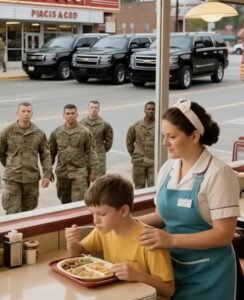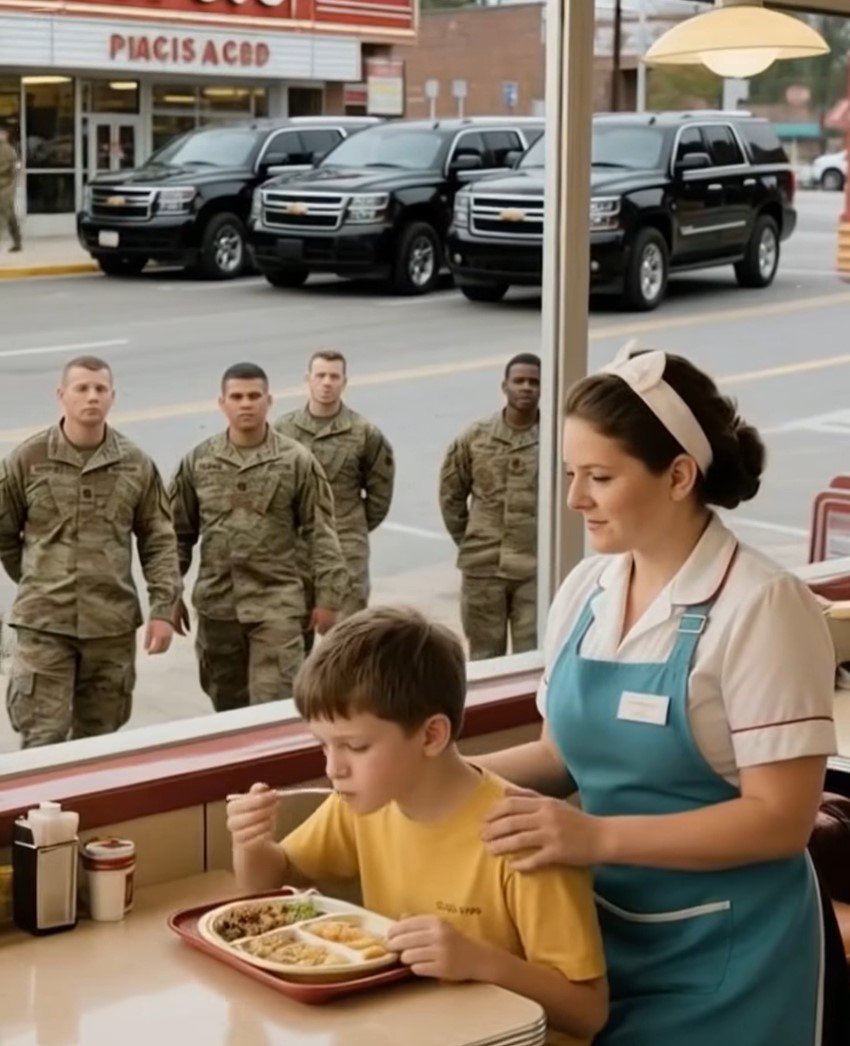The Typical Morning Routine
I opened the small café on the corner of Elm Street every morning before the sky had completely changed color due to sunrise. After wiping down the wooden tables, setting out fresh cups, and turning on the lights, I waited for the day’s regular rhythm to start—the delicate chime of the doorbell, the first hiss of steam, and the soft hum of the coffee maker.
I enjoyed my job because it was peaceful, dependable, and predictable. The same faces greeting each other and the same scents of sugar and roasted beans came and departed with drowsy smiles. However, I saw a boy for the first time one morning when I was refilling the napkin holders.

With brown hair that fell crookedly across his forehead and a rucksack that seemed to weigh as much as he did, he appeared to be around 10 years old and undersized for his age. Like clockwork, he arrived at 7:15 every single day. He only ever ordered a glass of water and sat at the same corner booth—the one by the window.
I didn’t give it much thought for the first several days. Perhaps he enjoyed the silence before school, or perhaps he was waiting for someone. However, I became aware of a change in him on the eighth day. He talked too quietly, sat too motionless, and had a fatigue in his eyes that was well beyond his years.
The Initial Pancakes
Something changed within me on the morning of the fifteenth. I couldn’t stand to see him sit there acting as though he wasn’t hungry. I then brought a plate of warm, golden pancakes with a little syrup on top.
I said softly, “We made extra by accident,” as if it were a trivial error.
Startled,
he looked up. Then a bashful smile softened his features. “I’m grateful,” he muttered.
I started leaving a plate for him every day after that morning; it might have been pancakes, eggs, and toast, or simply a muffin and some milk. He didn’t provide answers, and neither did I. We just spent peaceful mornings together, a hidden act of compassion sandwiched between two typical lives.
I came to anticipate the faint scrape of his chair and the sound of his tiny sneakers tapping the floor. He stayed briefly, always saying, “See you tomorrow,” and nodding courteously.
And for some reason, those words—so insignificant and straightforward—became the thing I looked forward to the most.
The Day He Didn’t Show Up
Then the chair in the corner remained unoccupied one chilly morning. The timer struck 7:15 and then 7:30. There was no sound from the bell over the door. He might just be late, I told myself. But as the minutes went by, my chest began to feel oddly heavy.
The typical morning crowd had gathered in the café by nine o’clock. I took orders, smiled, and poured coffee, but I was waiting inside. keeping an eye on the door.
The waiting period concluded at 9:17.
A quartet of black SUVs arrived outside the café. A group of uniformed soldiers emerged while the engines hummed steadily and softly. The café’s commotion subsided into quiet. “Is the woman who fed the boy here?” murmured one of the tall, square-shouldered men, taking off his cap.
My throat shut. “I am… I managed to say, “I am her.”
He gave me a note that was folded. Gently, he stated, “His name was Adam.” His dad served in the military. He died while performing his duties.
My hands trembled as I opened the mail. There were a few straightforward sentences penned in an uneven, cautious hand inside:
“Grateful to the café employee who provided my youngster with food. She restored the sense of being remembered that the world had taken away from him.
Tears filled my eyes, blurring the words. I was holding a plate when it fell out of my hands and broke on the ground. Nobody made a move. In quiet awe, the warriors stood. I could hardly breathe, let alone talk.
The Letter That Persisted
I sat at the counter for a long time after they departed, the letter shaking in my hands. Slowly, the sounds of the café returned, including the clinking of spoons and the hiss of the coffee maker, but nothing seemed the same.
I kept looking toward the corner booth for days after that, half expecting to see him there again. Unable to break the habit, I continued to prepare his breakfast. The pancakes cooled on the plate each morning before I put them away.
Weeks went by. The world went on, as it always does. However, I couldn’t let that boy go. To him, to me, and to a guy who would never return home, the little kindness we shared had meant the world.
The Second Letter
Then another letter came one afternoon. The officer who gave me the previous one also gave me this one. Inside was a photograph and a short note.
The photo showed Adam sitting on the grass beside a man in uniform—smiling, the same shy, gentle smile I remembered.
The note read:
“Adam was adopted by his father’s best friend, a soldier whose life his father once saved. He has a home now. And he often thinks of the woman who fed him in the mornings.”
I pressed the photo to my heart. Relief, sorrow, and gratitude mingled together until I couldn’t tell them apart. I had thought I’d lost him forever, but here he was—alive, safe, loved.
The Memory That Stays
Even now, years later, I keep that photograph framed behind the counter. Customers sometimes ask who the boy is, and I tell them, “He’s a reminder.”
A reminder that small acts—an extra plate, a few kind words, a moment of care—can reach further than we ever imagine.
Adam taught me that compassion doesn’t need grand gestures. It just needs quiet consistency. Sometimes the simplest kindness can become the anchor that keeps a heart from drifting too far.
And though I never saw him again, every morning when I pour the first cup of coffee and set out the plates, I still whisper, “Good morning, Adam.”
Because love, once given freely, never truly disappears—it just finds a new home.


